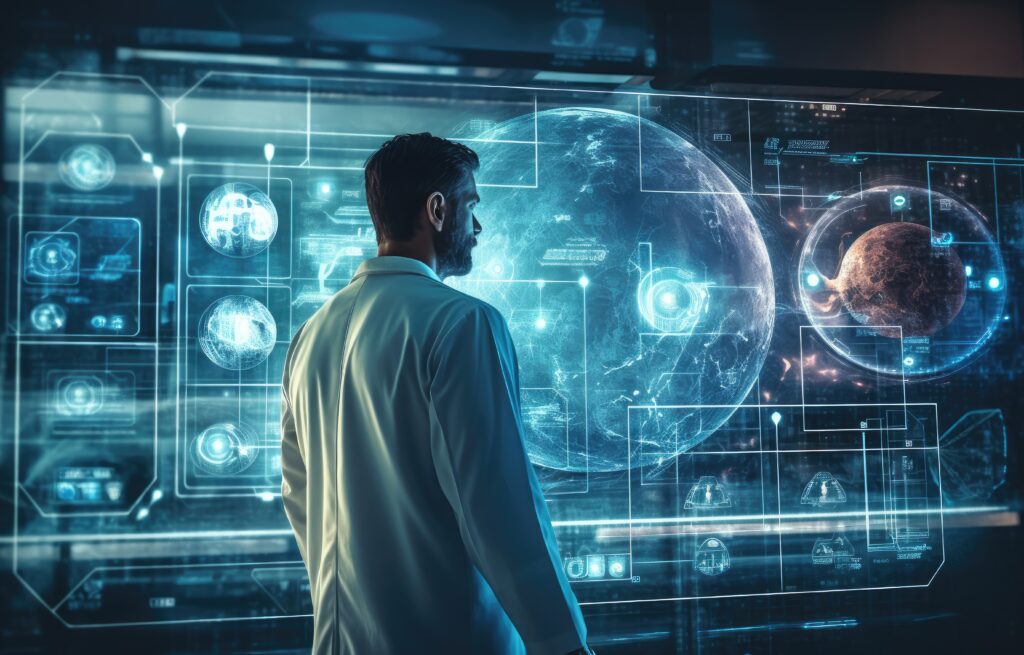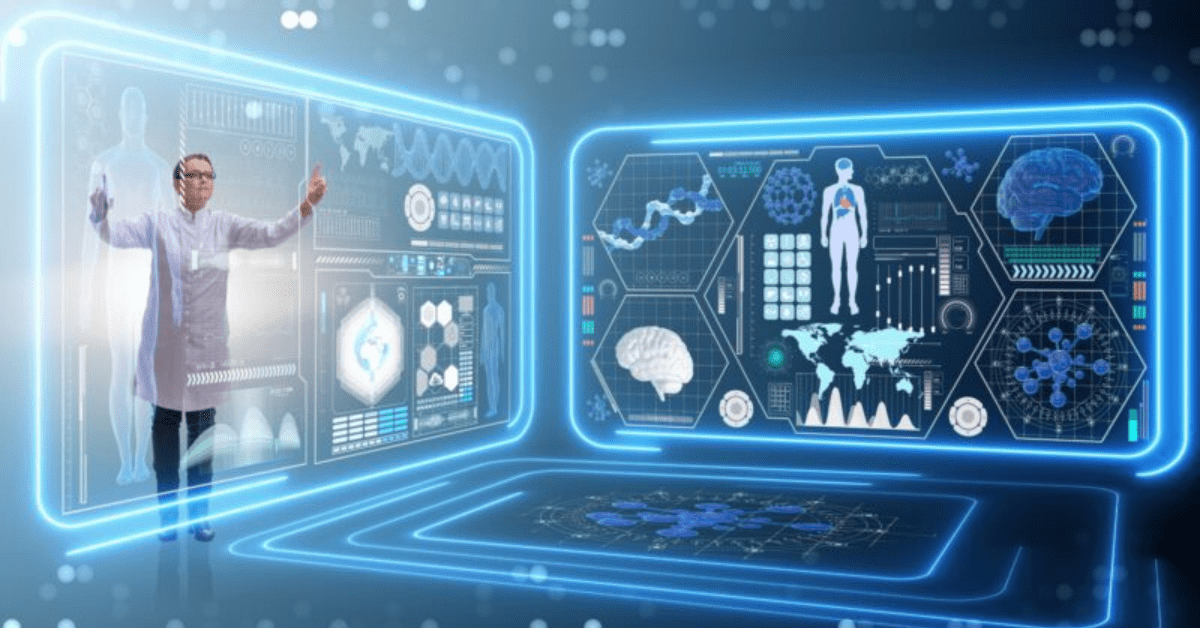Artificial Intelligence (AI) is at the forefront of a technological revolution, and its applications in healthcare are reshaping the medical industry. From early disease detection to personalized treatment plans, AI in healthcare has proven to be a game-changer. This article delves into how AI is transforming healthcare, its benefits, challenges, and future potential.
What is AI in Healthcare?
AI in healthcare refers to the application of advanced technologies like machine learning, natural language processing (NLP), predictive analytics, and computer vision to transform how medical data is analyzed and how care is delivered. These intelligent systems can process vast amounts of clinical, genetic, and imaging data far faster than human capability, enabling healthcare professionals to make more accurate diagnoses, personalize treatment plans, and predict health outcomes with greater precision.
From identifying early signs of diseases through medical imaging to automating administrative tasks and optimizing hospital workflows, AI is reshaping every aspect of the healthcare ecosystem. By uncovering hidden patterns in complex datasets, AI empowers clinicians to make data-driven decisions, reduce diagnostic errors, and enhance patient care experiences.

The Benefits of AI in Healthcare
- Improved Diagnostic Accuracy
AI-powered tools can analyze medical images, lab results, and patient records to detect diseases like cancer, heart conditions, and neurological disorders at earlier stages—often with greater precision than traditional methods. -
Personalized Treatment Plans
By analyzing individual patient data, including genetics and lifestyle factors, AI helps doctors tailor treatments that are more effective and better suited to each patient’s unique needs. -
Predictive Analytics for Better Outcomes
AI can forecast disease progression, hospital readmissions, and potential complications, enabling proactive care and early interventions that improve long-term outcomes. -
Operational Efficiency
From automating administrative tasks like billing and appointment scheduling to managing patient flow and resources, AI helps hospitals and clinics operate more efficiently. -
Faster Drug Development
AI accelerates pharmaceutical research by predicting how compounds will behave, identifying promising drug candidates, and optimizing clinical trials—saving time and reducing costs. -
Remote Patient Monitoring
AI-powered wearable devices and mobile apps track real-time health metrics, alerting healthcare providers to critical changes and enabling continuous care outside hospital settings. -
Enhanced Patient Experience
AI chatbots and virtual assistants offer 24/7 support, answer health queries, schedule appointments, and improve communication, making healthcare more accessible and user-friendly. -
Reduction in Human Error
AI assists doctors and nurses by cross-referencing data, alerting to anomalies, and providing decision support, significantly reducing the likelihood of medical errors.
Applications of AI in Healthcare
1. Medical Imaging
AI algorithms analyze medical images for early disease detection, such as identifying tumors in mammograms or detecting fractures in X-rays. These tools improve diagnostic accuracy and reduce human error.
2. Virtual Health Assistants
AI-powered virtual assistants provide patients with information, reminders for medication, and answers to common health queries. Examples include chatbots and voice assistants like Alexa and Siri, tailored for healthcare use.
3. Robotic Surgeries
AI-guided robotic systems enhance the precision of complex surgeries. These systems assist surgeons by providing real-time data and ensuring minimal invasiveness.
4. Telemedicine
AI facilitates remote consultations by analyzing patient symptoms and medical history. It also assists doctors in providing accurate diagnoses and treatment recommendations during virtual appointments.
5. Chronic Disease Management
AI tools monitor patients with chronic conditions, such as diabetes or hypertension, by analyzing real-time data from wearable devices. This ensures timely interventions and better disease management.
management.
6. Mental Health Support
AI-powered platforms like Woebot and Wysa offer mental health support through chat-based interactions, providing therapy and coping strategies. These tools make mental health resources more accessible, especially in underserved areas.
7. Public Health Surveillance
AI aids in tracking and predicting disease outbreaks by analyzing patterns from social media, news reports, and medical records. This helps governments and healthcare organizations respond proactively to public health crises.
Challenges and Ethical Concerns
1. Data Privacy and Security
Healthcare data is highly sensitive, and AI systems must comply with regulations like HIPAA and GDPR. Ensuring the security of patient data remains a significant challenge.
2. Bias in Algorithms
AI models can inherit biases from the datasets they are trained on, leading to disparities in healthcare outcomes. Addressing this requires diverse and representative data.
3. High Implementation Costs
The adoption of AI technologies involves significant investment in infrastructure, training, and maintenance, which can be a barrier for smaller healthcare providers.
4. Legal and Regulatory Issues
The lack of standardized regulations for AI in healthcare creates uncertainty about accountability, especially in cases of errors or adverse outcomes.
Real-Time Examples of AI in Healthcare
-
IBM Watson Health
Uses natural language processing and machine learning to assist in cancer diagnosis and treatment by analyzing medical literature and patient data to recommend treatment options. -
Google DeepMind (now Isomorphic Labs)
Developed an AI system that can detect over 50 eye diseases with the same accuracy as expert ophthalmologists by analyzing 3D retinal scans. -
Aidoc
An AI-based radiology tool that analyzes medical images (like CT scans) in real-time to identify urgent abnormalities such as brain hemorrhages and strokes, helping radiologists prioritize critical cases. -
PathAI
Uses AI to assist pathologists in diagnosing diseases like cancer more accurately by analyzing tissue samples and identifying patterns that are difficult to detect manually. -
Tempus
Combines AI with clinical and molecular data to deliver personalized cancer care and improve outcomes by identifying targeted therapies and clinical trials. -
Babylon Health
An AI-powered virtual health assistant and telemedicine app that offers symptom checking, health monitoring, and consultations based on real-time user input. -
Zebra Medical Vision
Uses AI algorithms to interpret medical imaging data and detect a range of diseases including breast cancer, osteoporosis, and cardiovascular conditions. -
Butterfly Network
Offers AI-enhanced handheld ultrasound devices that connect to smartphones, making ultrasound imaging more accessible even in remote or underserved areas. -
Qure.ai
An Indian startup using AI to read X-rays, CT scans, and MRIs for faster diagnosis of tuberculosis, COVID-19, and head injuries in both urban and rural healthcare settings. -
HeartFlow
Uses AI to create a 3D model of a patient’s coronary arteries from a standard CT scan, helping doctors assess the severity of coronary artery disease non-invasively.
The Future of AI in Healthcare
The potential of AI in healthcare is limitless. Future advancements include:
- Advanced Predictive Models: AI will provide even more accurate predictions for disease outbreaks and individual health risks.
- Integration with Wearable Devices: Smart devices will work seamlessly with AI systems to deliver real-time health monitoring and feedback.
- Global Health Applications: AI can bridge healthcare gaps in underserved regions by providing diagnostic tools and virtual consultations.
- Genomics and Precision Medicine: AI will play a significant role in decoding genomes faster and more accurately, enabling precise treatments for genetic disorders. Platforms like Deep Genomics are already pioneering this field (source).
- AI in Rehabilitation: Tools like NeuroRehab VR are leveraging AI to create personalized rehabilitation programs for patients recovering from strokes or injuries (source).
As AI continues to evolve, it promises to revolutionize the medical field, making healthcare more accessible, efficient, and patient-centered.
Conclusion
AI in healthcare is transforming the industry, offering innovative solutions to long-standing challenges. From enhancing diagnostics to enabling personalized medicine, AI has the potential to revolutionize patient care. However, addressing challenges such as data privacy and algorithmic bias is crucial to realizing its full potential. For more insights on how AI is shaping the future, visit Tech Talks Today.
AI’s integration into healthcare is not just a trend but a necessity for advancing medical science and improving patient outcomes. Embracing this technology responsibly will ensure a healthier future for all.

